



That Srijit Mukherjee experimented to bring alive the matinee idol on the big screen earlier this year with Oti Uttam goes to show the enduring legacy of yesteryear Bengali legends, besides, of course, the craze of the Bengali audiences with heroes from the past as the present remains dismal, barring a few fleeting moments of glowing hope.
In Uttam Kumar: A Life in Cinema (2021), author Sayandeb Chowdhury begins with an anecdote about Bengali cinema’s two foremost immortals: Satyajit Ray and Uttam Kumar. The year was 1966. Ray’s film, Nayak, starring Uttam and Sharmila Tagore was releasing the next day at Kolkata’s Indira Cinema. Ray dialled Kumar’s number and urged him to be present. The latter feared a pandemonium if he were to be present. The director, in his iconic baritone, told the star: “Uttam, don’t forget it’s a Satyajit Ray. Please be there.” It was hard to say no to Manik-da. The minute Uttam walked on to the stage, the burgeoning crowd fell silent, as if at the wave of a magic wand. That moment, like the film that was about to be screened, encapsulates the fantasy that was Bengali cinema. And, writes Chowdhury, “it was not Ray who colonised that cinema, either as fantasy or as commerce. It was Uttam Kumar. And only Uttam Kumar.”
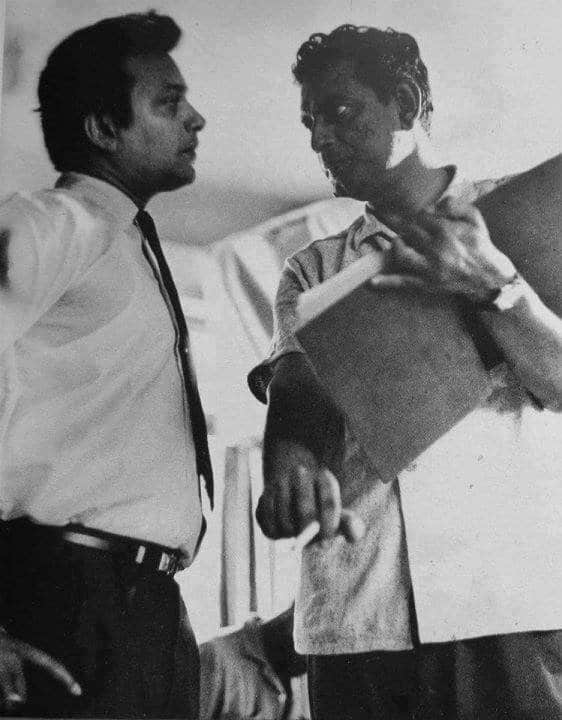 Satyajit Ray (right) and Uttam Kumar. (Image via X)
Satyajit Ray (right) and Uttam Kumar. (Image via X)
If Ray turned Soumitra Chatterjee into the Bengali arthouse cinema star, the larger-than-life matinee idol Uttam Kumar, endearingly called Mahanayak and Guru by his fans and the industry, held his position as Bengali mainstream cinema’s lodestar pretty strongly. He remains unmatched till date.
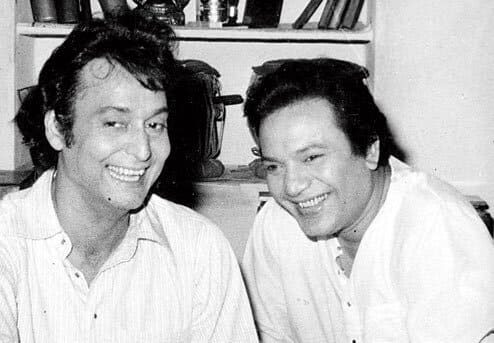 Soumitra Chatterjee (left) and Uttam Kumar. (Image via X)
Soumitra Chatterjee (left) and Uttam Kumar. (Image via X)
He was a hero who brought to the screens Bengal’s bhadralok (gentility) world view and brought the morally upright middle classes into film theatres. Sharmistha Gooptu notes in Bengali Cinema: ‘An Other Nation’ (2010), “He [Uttam Kumar] made the film star respectable.” It was marked by “‘homeliness’ — a culmination of sorts of the quotidian appeal.” Gooptu further notes that Uttam Kumar “developed a naturalistic acting style, principally deriving from everyday speech idioms, breaking away from theatrical styles of Bengali actors who came before him.”
And while Uttam Kumar has left us with great films, paired opposite some of Bengal’s iconic actresses, from Madhabi Mukherjee to Aparna Sen and Sharmila Tagore, every mention of Uttam Kumar almost always remains incomplete without a mention of Suchitra Sen in the same breath, evoking a nostalgia for a romance of yesteryear, with such songs as Tumi je amar, ogo tumi je amar (Harano Sur, 1957) to both of them sitting astride on a scooter, riding with Ei poth Jodi na shesh hoi (Saptapadi, 1961). The success of Suchitra-Uttam films lay in the success of the pairing, writes Shoma Chatterji in her book Suchitra Sen: The Legend and the Enigma (2015), to “identification that was rooted in the figures of an idealised female and an idealistic and ethical male, embodied respectively by Suchitra Sen and Uttam Kumar.”
A Times of India article note how when their on-screen chemistry in the romantic hit Agni Pariksha (1954) left Bengali viewers wanting to more, the film’s poster with a controversial caption didn’t sit well with their respective spouses, Gauri Chatterjee (Uttam Kumar’s first wife) and Dibanath Sen.
The iconic pair has a special place in Bengali film history, and their years on screen came to be referred to as Uttam-Suchitra Yug.
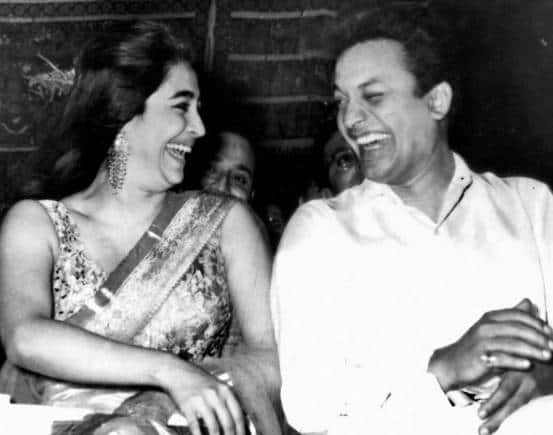 Legendary Bengali onscreen pair Suchitra Sen and Uttam Kumar. (Image via X)
Legendary Bengali onscreen pair Suchitra Sen and Uttam Kumar. (Image via X)
The pair raked up controversies off screen too. Magazines were replete with their so-called affairs. While the two maintained they were colleagues, their fans asserted with an uncanny certainty that they were couples. And a famous face-off between Suchitra and Uttam’s second wife, the actress Supriya Devi (famously remembered for Ritwik Ghatak’s Meghe Dhaka Tara, 1960).
A TOI article notes, in 1972, Uttam Kumar and Suchitra Sen were shooting for a dance sequence in Chandipur for Salil Dutta’s Har Mana Har. Rumour has it that Suchitra Sen asked Supriya Devi jokingly whether she was feeling jealous to see them dancing. Supriya Devi quipped promptly that she had seen these romantic scenes on the big screen so many times. Daily Pioneer notes another such incident: Once, when Suchitra called up to speak to Uttam, on being informed that he had stepped out, she mischievously added, “What a pity. I felt like kissing him.” These reflect the leg-pulling camaraderie and witty repartee between the two women and colleagues. Suchitra Sen’s biographer Gopal Krishna Roy told Daily Pioneer that Suchitra on being asked about her relationship with Uttam, she’d “clam up or get into a philosophical mood. It would be impossible to extract a proper reply from her. ‘When I told her once that there was a particular look she had for Uttam, which was distinctly different from what she had for other heroes, she ignored the fact and went on to say that on the sets, they were nothing but extreme professionals. What they were outside the sets, therefore, remains a matter of much speculation.’”
The great on-screen pair broke up in the 1960s and the two stars charted their individual careers thereafter. The two have also dabbled in Hindi cinema, if Suchitra Sen did Devdas (1955) and Aandhi (1975), among others, Uttam Kumar was seen in Amanush (1975) and Ananda Ashram (1977).
 Poster of Shakti Samanta's Hindi film Amanush (1975), starring Uttam Kumar and Sharmila Tagore.
Poster of Shakti Samanta's Hindi film Amanush (1975), starring Uttam Kumar and Sharmila Tagore.
On his 44th death anniversary today, July 24, here are 12 must-watch Uttam Kumar Bengali films, which if you haven’t watched till now, you must:
Saheb Bibi Golam (1956)
Directed by Kartik Chatterjee, the film is based on Bimal Mitra’s 1953 novel of the same name. It charts the fall of feudalism in Bengal during the British Raj and the crumbling zamindari system. Uttam Kumar plays the role of Bhootnath, the overseer of the haveli that is being demolished and the confidant of the chhoti bahu, a role that was played by Guru Dutt in his 1962 Hindi remake of the film, Sahib Bibi Aur Ghulam, among the most important films in Dutt’s career. Dutt stepped into his 100th year this year.
Harano Sur (1957)
Directed by Ajoy Kar, the romantic drama film, whose title is translated as ‘the lost tune’, turns the hero into an amnesiac in the wake of a train accident, and is rescued after escaping from an asylum, admitted and nursed by a doctor, played by Suchitra Sen. The song Tumi je amar remains a classic love song.
Saptapadi (1961)
No Bengali cinema’s on-screen romance talk is ever complete with this Suchitra-Uttam film and the classic song Eyi poth Jodi na sesh hoye (What if our path/journey never ends). The title translates to seven steps, which signals marriage but marriage — interfaith marriage — becomes the bone of contention as Uttam Kumar’s Krishnendu, a young Bengali Hindu medical student, falls in love with the Anglo-Indian Rina Brown (Suchitra Sen). Theatre and film actor-director Utpal Dutt directed a portion of the movie, which is a rendition of William Shakespeare’s Othello.
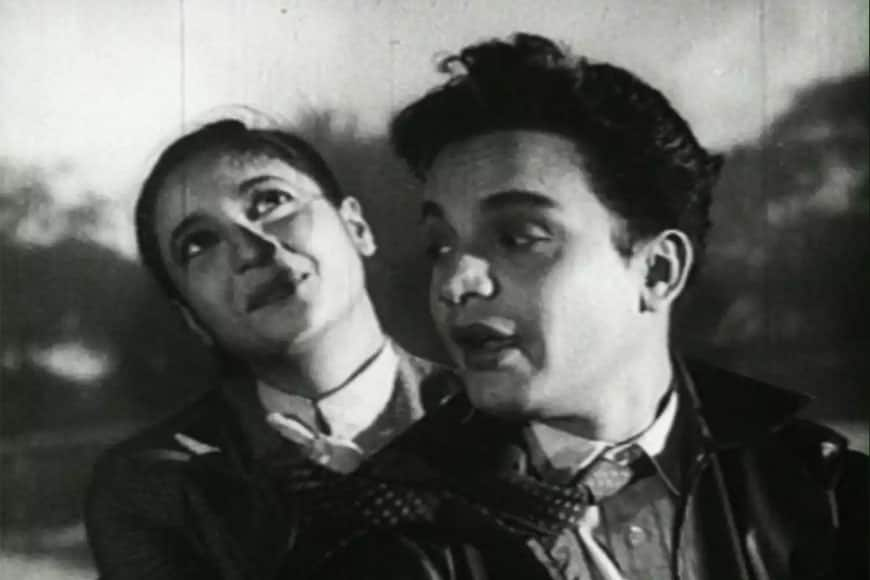 Suchitra Sen and Uttam Kumar in a still from 'Saptapadi'. (Image via X)
Suchitra Sen and Uttam Kumar in a still from 'Saptapadi'. (Image via X)
Deya Neya (1963)
Sunil Bandyopadhyay-directed Deya Neya (A Romantic Exchange), starring Uttam and Tanuja, “fulfils all the felicity of a romantic comedy. It would be rather apt to say that it employs them so successfully that it has since become an archetype of a specimen that could not be bettered in Bengali cinema,” notes Chowdhury in his book. An iconic father-son scene from the film between Uttam’s wanting-to-be-a-singer Prasanta and Kamal Mitra’s wealthy-industrialist-dad BK Roy is now a viral meme.
Bhranti Bilas (1963)
Who doesn’t recall the 1982 Sanjeev Kumar-Deven Verma double role film Angoor, directed by Gulzar, based on William Shakespeare’s play A Comedy of Errors? Years before Bollywood, Manu Sen adapted the comedy play, the master-servant duplicates, for the Bengali screen, with Uttam Kumar and Bhanu Bandopadhyay.
Nayak: The Hero (1966)
A story about a brash and haughty matinee idol, Arindam Mukherjee, on a 24-hour train journey from Kolkata to Delhi to receive a national award. On the train, he meets a young journalist (Sharmila Tagore’s Aditi Sengupta), who’s filled with contempt for the likes of him. This film is Satyajit Ray’s second entirely original screenplay after Kanchenjungha (1962).
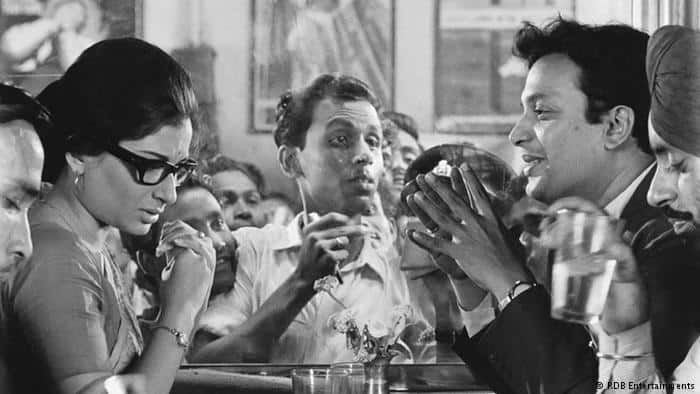 Sharmila Tagore and Uttam Kumar in a still from 'Nayak: The Hero'. (1966). (Image via X))
Sharmila Tagore and Uttam Kumar in a still from 'Nayak: The Hero'. (1966). (Image via X))
Antony Firingee (1967)
Singer Manna De’s song Aami Jamini, tumi shoshi he, written by Gauriprasanna Mazumder, from the film, picturised on Uttam Kumar, with a banjo, under a tree, singing away in dulcet notes. One of composer Anil Bagchi’s best works, the Sunil Bandyopadhyay-directed film is inspired by Madan Bandhopadhyay’s famous literary work Kobiyal Antony Firingee. The film is a musical drama based on the life of a Portuguese named Hensman Anthony, who came to India and made Bengal his home. Bengali traditional folk songs changed his life in turn. He married a Hindu widow Nirupama (played by Tanuja in the film). But it was a time of the Brahmin orthodoxy, which, when they learnt that a Christian was planning to organise Durga Puja, termed it blasphemy and burnt his wife to death.
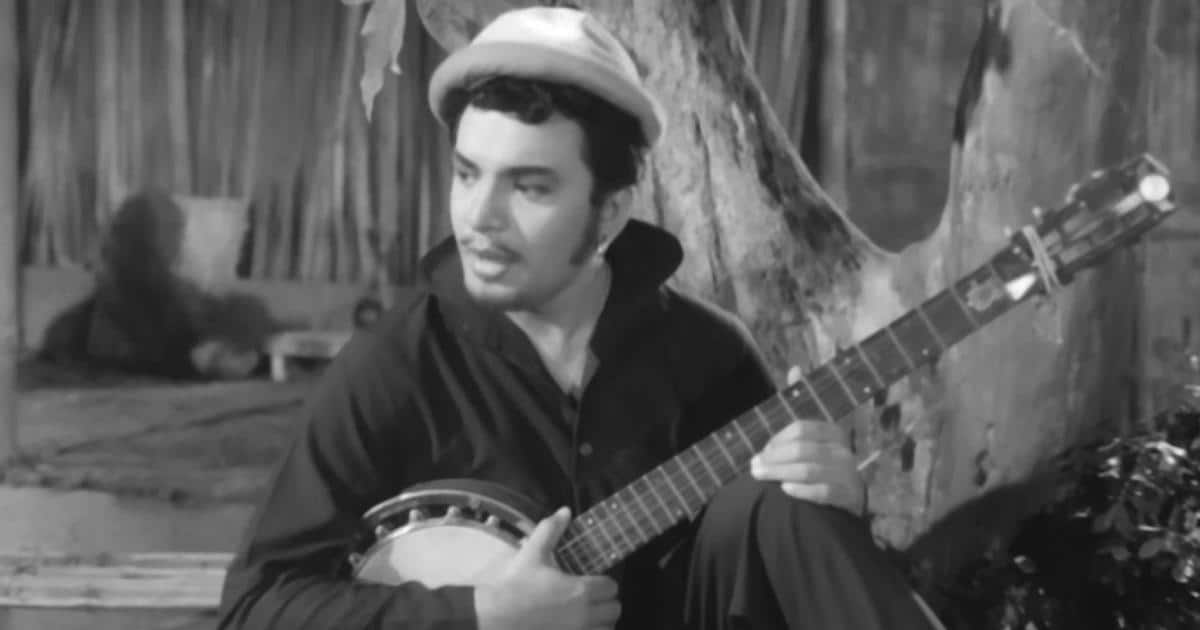 Uttam Kumar in a still from 'Antony Firingee'. (Image via X)
Uttam Kumar in a still from 'Antony Firingee'. (Image via X)
Chiriyakhana (1967)
Uttam Kumar as the detective Byomkesh Bakshi, the character created by writer Sharadindu Bandyopadhyay, was quite a sight. The screenplay for this crime thriller, whose title translates to zoo/menagerie, was written by Satyajit Ray. The film was remade into the Hindi television series, Byomkesh Bakshi, starring Rajit Kapoor, aired on Doordarshan.
Nishi Padma (1970)
So, you thought Rajesh Khanna nailed his role, opposite Sharmila Tagore, in Amar Prem (1972)? Its director Shakti Samanta gave superstar Khanna one brief: “You just have to copy Uttam Kumar from the original film (Nishi Padma; also starring Sabitri Chatterjee).” Khanna tried his best, but his Anand Babu cannot hold a candle to Uttam Kumar’s Ananga. Arabinda Mukherjee, who directed the Bengali original, wrote the screenplay for both the films, based on Bibhutibhushan Bandopadhyay’s short story Hinger Kochuri.
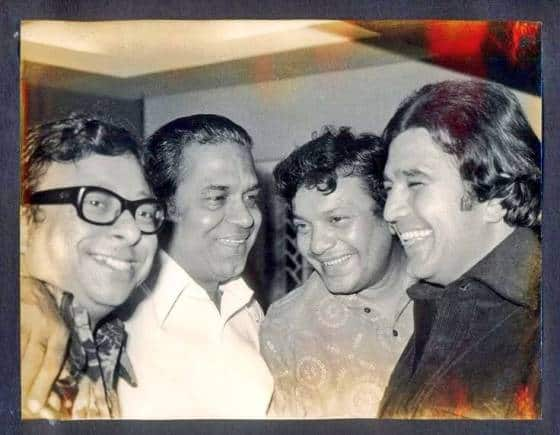 (From left) RD Burman, Shakti Samanta, Uttam Kumar and Rajesh Khanna. (Image via X)
(From left) RD Burman, Shakti Samanta, Uttam Kumar and Rajesh Khanna. (Image via X)
Chhadmabeshi (1971)
Recall Dharmendra as the disguised pure-Hindi-speaking comic chauffeur Pyare Mohan from Hrishikesh Mukherjee-directed Chupke Chupke (1975)? Agradoot directed Uttam Kumar in that role a few years ago in the Bengali original. Sharmila Tagore played Sulekha in the Hindi film while Madhabi Mukherjee essayed it in the Bengali film.
Bon Palashir Padabali (1973)
This romance drama written and directed by Uttam Kumar himself has the star in a toxic avatar, and is, perhaps, one of his best works till date. It is an adaptation of a novel of the same name by Ramapada Chowdhury and was produced under the banner of Uttam Kumar’s foundation Shilpi Sangsad. This melodrama about passion, violence and politics in the small village of Bon Palashi takes its recourse in several acting idioms, including folk theatre and is narrated through two sets of characters whose stories are intercut and merged. Uttam is peasant Udas who loves the good Padma (Supriya Choudhury) but is forced to marry the neurotic Laxmi (Basabi Nandi) in order to be allowed to learn to drive a bus. Both women eventually die as love takes a toxic turn.
Jadu Bansha (1974)
The Uttam Kumar and Aparna Sen pair reached its peak with this film directed by Partha Pratim Chowdhury, a former film critic. The film also starred Sharmila Tagore and Dhritiman Chatterjee. The political drama reflects the turbulent period of the 1960s-’70s. In an experimental style, the film captures the rising unemployment, giving into the Naxal movement, the anger, disappointment, regret and crises among the youth and desperate attempts at restoring a balance in all aspects of life.
EXTRA
Devdas (1979)
Directed by Dilip Roy, the oft-adapted story for the screen, based on Sarat Chandra Chattopadhyay’s romance novel about the heart-breaking and tragic love story of Devdas, needs no introduction, among Hindi film viewers in the post-Shah Rukh Khan-starrer Devdas world. Uttam Kumar played Devdas years before SRK did. And Dilip Kumar played it, in the 1955 Bimal Roy film, years before Uttam did.
Discover the latest Business News, Sensex, and Nifty updates. Obtain Personal Finance insights, tax queries, and expert opinions on Moneycontrol or download the Moneycontrol App to stay updated!
Find the best of Al News in one place, specially curated for you every weekend.
Stay on top of the latest tech trends and biggest startup news.